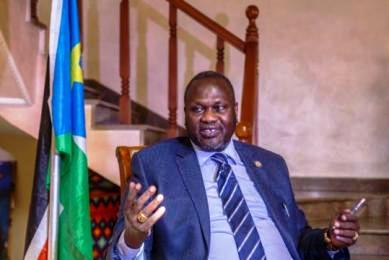- Stay Connected
Machar to arrive in Juba Saturday at 1pm: SPLM-IO official

April 22, 2016 (JUBA) – South Sudanese rebel leader and the first vice-president designate, Riek Machar, will arrive in the country’s capital, Juba on 23 April at 1:00pm, his official confirmed.
The armed opposition faction officials have also called on the residents of Juba to come out in big numbers on Saturday to receive the opposition chairman.
Ezekiel Lol Gatkuoth, chairperson for external affairs committee in the armed opposition faction of the Sudan People’s Liberation Movement (SPLM-IO), announced the long-awaited arrival of Machar in a statement circulated on the social media on Friday.
“The First Vice President of the Republic of South Sudan H.E Dr Riek Machar Teny-Dhurgon is scheduled to arrive Juba April 23, 2016 at 1:00 PM sharp,” Gatkuoth confirmed.
He said before Machar’s arrival in the early afternoon hours, the chief of general staff of the SPLA-IO, General Simon Gatwech Dual, will arrive in Juba in the morning, accompanied by 125 troops.
“The Chief of General Staff of SPLA (IO) 1st. Lt. General Simon Gatwech Dual and 125 other soldiers with their organic weapons are scheduled to arrive Juba at 10:00 AM April 23, 2016,” he revealed.
He added that the rest of 70 soldiers with their organic weapons will travel to Juba shortly after arrival of General Dual in Juba.
“The peace loving people of South Sudan are asked to come out and welcome His Excellency Dr. Riek Machar Teny-Dhurgon peacefully,” Gatkuoth added.
This came after South Sudanese government on Friday accepted that the 195 soldiers accompanying the top leadership would enter Juba with 20 PKMs and 20 RPGs besides their AK47s fitting their numbers.
The arrival of the first vice-president designate has been rescheduled three times due to disagreements over the number of the opposition soldiers and their weapons to enter Juba.
Machar is expected to be sworn in as first vice president immediately upon his arrival on Saturday.
He and President Salva Kiir will also start to form a transitional government of national unity to run the country for the next 30 months, pending elections at the end of the transition.
The two rival leaders will function almost like co-presidents and commander separate national armies as co-commanders-in-chief with their separate chiefs of general staff with army structures until a reunification of the two armies will be achieved during the interim period.Source :Sudan Tribune
